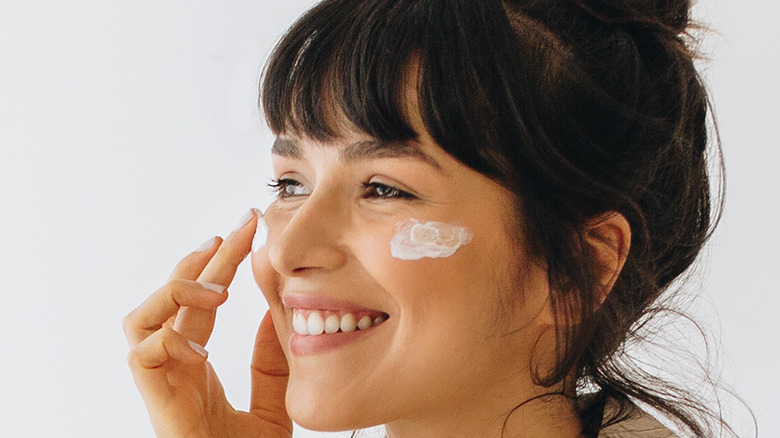What You Need To Know Before Using Vitamin F For Skin Care
When shopping for skincare products, it can be very confusing to pick the right type to address various skin woes. Plus, tons of ingredients promise life-changing results. From acids to vitamins, experts claim they treat and improve the skin. Now and then, a new super ingredient becomes the latest hype for better skin health — just like Vitamin F. Multiple skincare brands use the ingredient for numerous products like face oils, moisturizers, serums — and with good reason (via InStyle).
"Vitamin F has a ton of great skin and health benefits," says Dr. Shari Sperling of Sperling Dermatology in New Jersey. "It helps maintain skin barrier, thus effective for skin conditions like atopic dermatitis [the most common type of eczema] and psoriasis. It aids in moisturizing skin, helps with acne, and keeps in moisture."
However, contrary to popular belief, Vitamin F is not a vitamin. According to Healthline, the ingredient is a term for two essential fatty acids — alpha-linolenic acid (ALA) and linoleic acid (LA). While it offers abundant benefits, it is still good to know more about the ingredient before usage.
Who can use Vitamin F?
Vitamin F is great for all skin types, but people with acne-prone skin can reap more benefits from using products with this ingredient. According to a study from 1998, acne sufferers "were able to reduce the pustule size by 25% in as little as one month by applying linoleic acid topically" (via Byrdie). Not only that, but Vitamin F is also magical for individuals who suffer skin issues, like psoriasis or dermatitis, as it "helps reduce inflammation as well as regulate healthy cell function, and excessive water loss," says cosmetic chemist David Petrillo of Perfect Image skincare.
The multifunctional ingredient can also protect the skin from harmful UV rays. Electromagnetic radiation is present all year round, and sun exposure (especially too much of it) can induce aging. One way to fight UV rays is to wear sunscreen, but what if you forget to apply it to your skin? This is where Vitamin F comes in. The ingredient can "help minimize inflammation and boost recovery from environmental exposure which damage healthy skin cells, and provide an added layer of systemic photo-protection, for those days you forget to apply sunscreen," says Petrillo.
How and when to use Vitamin F
The proper use of Vitamin F depends on each product. As you know, many brands incorporate the ingredient with various skincare items — from moisturizers to serums and oils. That is why reading the label at the back of each bottle is very important. However, when you fancy using Vitamin F's pure form, which is an oil, take extra caution in doing so. When introducing a new skincare product to your skin, it's best to take it one day at a time. "As a topical, it can be used one to two times per day," says David Petrillo of Perfect Image skincare. "But it is best to start off with once per day to see how your skin reacts to it before increasing frequency" (via Byrdie).
Like the pure form, one should also be attentive in using certain Vitamin F products. While the general rule of thumb is to use skincare items with the ingredient only twice a day — specifically morning and evening. "However, if the product contains a retinol or vitamin A component, it is best to use at bedtime. That's because retinol and vitamin A products may cause redness or drying. So exercise caution," says Stacy Chimento, MD, of Miami's Riverchase Dermatology (via Byrdie).


